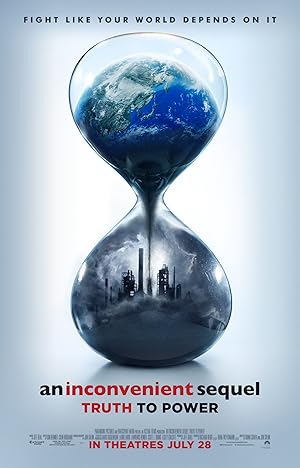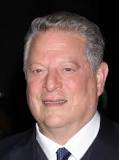
An Inconvenient Sequel: Truth to Power Page #4
"Even if everything"
"Al Gore's been saying
since the '80s is true,"
"it's gonna cost so much money,"
"it's gonna
cripple the economy."
It's an insidious theme
that we've seen before,
but it's coming back
with a new force.
And I think that
this is something we're
focusing on very intently.
We want to know who the groups
are who are doing this,
what is their analysis,
what's the science,
and what are the government
actions that are being taken?
Assuming for the moment
that the facts prove
that's what they did,
that's a violation of the law,
isn't it?
That's consumer
and securities fraud.
But it's clear that
what they've done is
essentially tried to cripple
our ability, mankind's ability,
to respond
to this existential threat.
A few days ago,
the Attorney General of
the State of New York
launched an investigation
of ExxonMobil
for fraud and funneling money
to this new form of denial
where people are out there
minimizing solar, saying,
"It's not going anywhere."
"Why are you wasting
your time on this?" Et cetera.
Utility monopolies really,
really fear disruption,
and have woken up and said,
"Wow, this solar thing,"
"I need to crush it
before it kills me."
The last two weeks,
we had 55,000 people
sign up in Nevada to say,
you know,
"I want choice,
I want energy freedom."
What happened in Nevada
will send a massive message
to the rest of the country.
Yeah, I think so. Yeah.
Thank you. Will there
be bumps in the road?
You bet there will be.
But, at the end of the day,
you really are
on the front lines.
On the rooftops, if you will.
And we're seeing this play out
in every part of the world.
We've had 150 years of
burning fossil fuels
with the many blessings,
poverty's gone down,
living standards have increased.
So naturally, there still are
some people that say,
"Well, we just have to keep
relying on oil and gas"
"and even coal."
But it is worth pointing out
that in northern China,
life expectancy has gone down
five and a half years
because of air pollution.
And in Beijing, the mayor said,
"My city is not livable."
But in many parts of China
it is already cheaper
to get electricity
from solar and wind.
So this is the time
when your presentations
can provide support for your
government's determination
to do even better
with renewable energy.
Fine. How are you?
There are so many commitments
that governments are thinking
about making right now
for hundreds of new coal plants.
Even as the revolutionary drop
in cost from renewables
is picking up speed.
China's one of these countries.
And there are numbers of
others. India, others.
Unfortunately, they've looked
at the price of coal.
They see the price low,
and they feel they're compelled
therefore to try to provide
for their people.
So if India proceeds
to build the number of plants
it is currently planning,
and they are coal fired,
it can erase everything
everybody else
is trying to do
in terms of reductions.
We've got to figure out
a way to crack that nut.
Absolutely.
Now, climate change is high
on world leaders' agendas.
And that's because the crucial
U.N. talks in Paris
start in less than two months,
when the world gets together
to try to agree
on a global deal.
One of the sticking points
remains financing.
My agenda is dominated right now
by the preparations for the
climate conference in Paris.
The world's been preparing
for it a long time.
And the main objective is
to speed up
the transition
to renewable energy,
so that the entire world
can bring down
the pollution levels
while continuing
to reduce poverty.
But there is still a big divide
between rich countries
and poor countries.
So, thank you
for arranging this,
and for the privilege of
talking with you.
As you know,
I have this passion for
solving the climate crisis
that goes back 40 years. And...
Because I have studied it
so closely, I'm hoping that
the United States and India
will accelerate
our transitions to
renewable energy together.
India has always looked
at the United States
as a valuable partner.
But sadly, the Western world,
the developed world
does not seem
to be coming forth with
significant amounts of support.
And seems to be creating
more impediments.
All this talk about supporting
climate change
seems to be only talk,
and there's hardly
any action on that.
- In the U.S.?
- Yeah, from the U.S.
I don't think it's fair,
with all due respect,
if you may?
- Sure, please.
- Well, in the U.S.
in calendar year, uh, 2015,
if you look at the investments
in the U.S.
in the building of new, uh,
electric generating capacity,
three-quarters is
from solar and wind.
- May I respond to that?
- Yes. Please.
I'll do the same thing
after 150 years.
After I've used my coal.
After I've got my people jobs.
After I've created
my infrastructure
and highways and roads.
When I have technology.
When my people earn
$50,000-$70,000
per capita income,
using low-cost
fossil fuels-based energy.
The way the United States did
for 150 years.
It's very easy to say now that,
"Oh, we are not using coal!"
What about in the past?
So I'm only asking for
that carbon space
which you utilized
for 150 years.
My point is not
to deny your right
to make your own choices as to
what kind of energy you want.
Obviously you have that right.
But what I am saying,
when is the sun coming up today?
I don't see it anywhere.
I don't see the blue sky.
When any of us walk outside
and look up at the sky,
our natural impression is
that the sky looks like it's
a vast and limitless expanse.
Goes on forever.
Actually, the atmosphere
of the Earth
is a very thin shell
surrounding the planet.
And, of course, right now
we are putting 110 million tons
of heat-trapping
global-warming pollution
into that space
every single day.
We're using this
as an open sewer
for all of the gaseous waste
in our global civilization.
Agriculture is
a big cause of it.
Burning of forests and
burning of cropland.
But still, the main part of
the problem
is the emission of
carbon dioxide
from the burning of
coal, oil, and gas.
And that builds up heat energy
and raises temperatures.
India just set their
all-time high temperature
record in May.
123.8 degrees Fahrenheit.
The streets are melting.
We have built
a civilization for conditions
that we are now in the process
of radically changing.
All-time records have
been broken this year
in Thailand and Cambodia
and Laos.
In Pakistan, over 1,200 people
died in the heat wave there.
This year, they have dug
anticipatory mass graves
for the people
they fear will die
in this year's heat waves.
And we're seeing that
the higher temperatures
are shifting the balance
between microbes
and human beings.
The transportation revolution
has a lot to do with this.
Air travel.
But the climate conditions
have a big impact on that.
Let's look at Zika.
Translation
Translate and read this script in other languages:
Select another language:
- - Select -
- 简体中文 (Chinese - Simplified)
- 繁體中文 (Chinese - Traditional)
- Español (Spanish)
- Esperanto (Esperanto)
- 日本語 (Japanese)
- Português (Portuguese)
- Deutsch (German)
- العربية (Arabic)
- Français (French)
- Русский (Russian)
- ಕನ್ನಡ (Kannada)
- 한국어 (Korean)
- עברית (Hebrew)
- Gaeilge (Irish)
- Українська (Ukrainian)
- اردو (Urdu)
- Magyar (Hungarian)
- मानक हिन्दी (Hindi)
- Indonesia (Indonesian)
- Italiano (Italian)
- தமிழ் (Tamil)
- Türkçe (Turkish)
- తెలుగు (Telugu)
- ภาษาไทย (Thai)
- Tiếng Việt (Vietnamese)
- Čeština (Czech)
- Polski (Polish)
- Bahasa Indonesia (Indonesian)
- Românește (Romanian)
- Nederlands (Dutch)
- Ελληνικά (Greek)
- Latinum (Latin)
- Svenska (Swedish)
- Dansk (Danish)
- Suomi (Finnish)
- فارسی (Persian)
- ייִדיש (Yiddish)
- հայերեն (Armenian)
- Norsk (Norwegian)
- English (English)
Citation
Use the citation below to add this screenplay to your bibliography:
Style:MLAChicagoAPA
"An Inconvenient Sequel: Truth to Power" Scripts.com. STANDS4 LLC, 2025. Web. 6 Mar. 2025. <https://www.scripts.com/script/an_inconvenient_sequel:_truth_to_power_2786>.







Discuss this script with the community:
Report Comment
We're doing our best to make sure our content is useful, accurate and safe.
If by any chance you spot an inappropriate comment while navigating through our website please use this form to let us know, and we'll take care of it shortly.
Attachment
You need to be logged in to favorite.
Log In